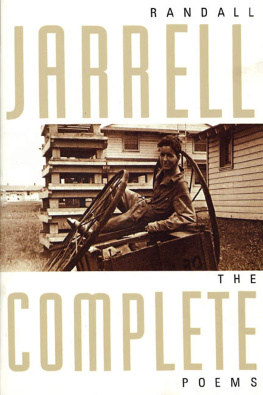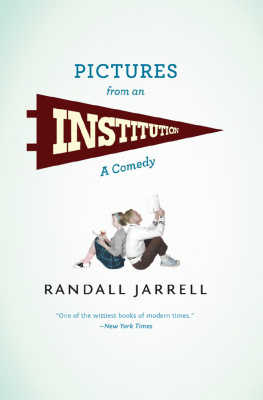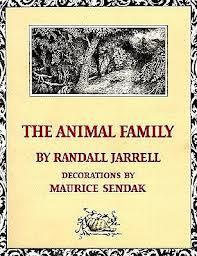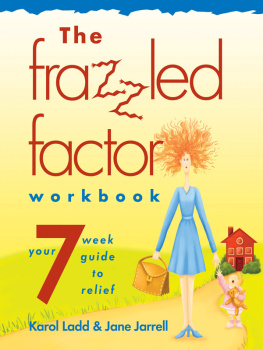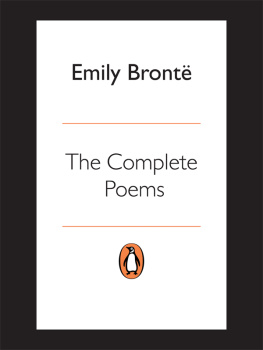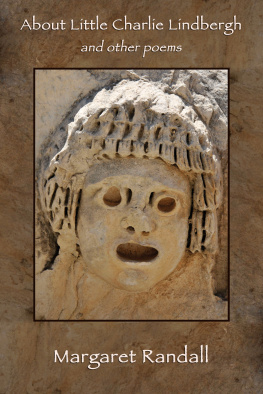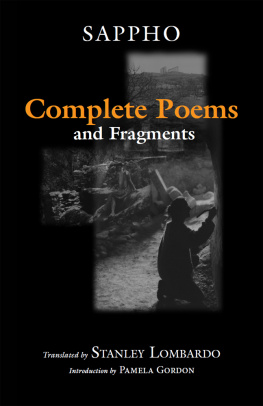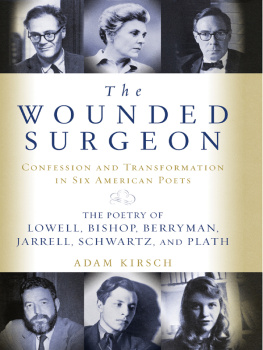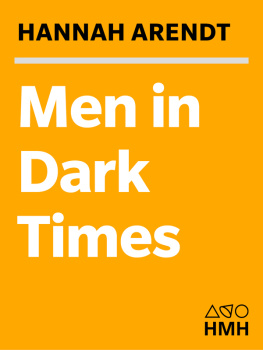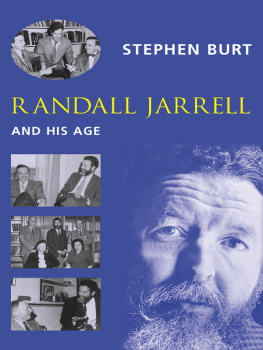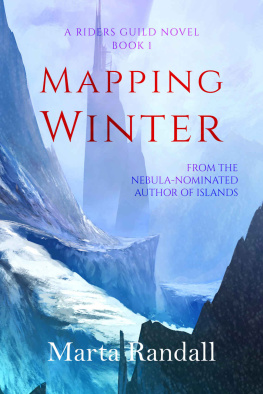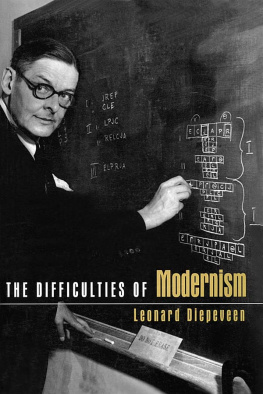Randall Jarrell - The Complete Poems
Here you can read online Randall Jarrell - The Complete Poems full text of the book (entire story) in english for free. Download pdf and epub, get meaning, cover and reviews about this ebook. year: 1969, publisher: Farrar, Strauss & Giroux, genre: Art. Description of the work, (preface) as well as reviews are available. Best literature library LitArk.com created for fans of good reading and offers a wide selection of genres:
Romance novel
Science fiction
Adventure
Detective
Science
History
Home and family
Prose
Art
Politics
Computer
Non-fiction
Religion
Business
Children
Humor
Choose a favorite category and find really read worthwhile books. Enjoy immersion in the world of imagination, feel the emotions of the characters or learn something new for yourself, make an fascinating discovery.
- Book:The Complete Poems
- Author:
- Publisher:Farrar, Strauss & Giroux
- Genre:
- Year:1969
- Rating:5 / 5
- Favourites:Add to favourites
- Your mark:
- 100
- 1
- 2
- 3
- 4
- 5
The Complete Poems: summary, description and annotation
We offer to read an annotation, description, summary or preface (depends on what the author of the book "The Complete Poems" wrote himself). If you haven't found the necessary information about the book — write in the comments, we will try to find it.
The Complete Poems — read online for free the complete book (whole text) full work
Below is the text of the book, divided by pages. System saving the place of the last page read, allows you to conveniently read the book "The Complete Poems" online for free, without having to search again every time where you left off. Put a bookmark, and you can go to the page where you finished reading at any time.
Font size:
Interval:
Bookmark:
Randall Jarrell THE COMPLETE POEMS Farrar, Straus and Giroux
New York
Copyright 1935, 1936, 1937, 1940, 1941, 194a, 1944, 1945, 1946, 1947, 1948, 1949, 1950, 1951, 1952, 1965, 1966, 1967, 1968, and 1969 by Mrs, Randall Jarrell. Copyright renewed 1968, 1969 by Mrs. Randall Jarrell Selected Poems, Copyright 1945, 1951, 1955 by Randall Jarrell. Poems from The Woman at the Washington Zoo, Copyright 1945, 1950, 1953, 1954, 1958, i960 by Randall Jarrell; Copyright 1949 by The Nation, Copyright 1952 by the Curtis Publishing Company; Copyright 1953 by Accent; Copyright 1956, 1959 by the University of Nebraska Press; Copyright 1956, 1957 by The Virginia Quarterly Review; reprinted by permission of Atheneum Publishers. Poems from The Lost World, Copyright 1948, 1961, 1962, 1963, 1964, 1965 by Randall Jarrell; reprinted by permission of The Macmillan Company.
The Chipmunks Day, from The Bat-Poet, Copyright The Macmillan Company 1964; reprinted by permission of The Macmillan Company.
The Author to the Reader is reprinted from A Sad Heart at the Supermarket by permission of Atheneum Publishers; Copyright 1962 by Randall Jarrell Mr. Jarrells translations of poems by Rainer Maria Rilke are published here by permission of W. W. Norton & Company, Inc., and Insel-Verlag, Frankfurt-am-Main.
Certain of these poems first appeared in Accent, American Review, The American Scholar, Arizona Quarterly, Art News, The Atlantic Monthly, Botteghe Oscure, Commentary, Harpers Magazine, The Kenyon Review, Ladies Home Journal, The Nation, The New Republic, The New Yorker, The New York Review of Books, Partisan Review, Poetry, Prairie Schooner, Quarterly Review of Literature, The Sewanee Review, The Southern Review, transition, View (New York), and The Virginia Quarterly Review Library of Congress catalog card number: 68-29469 All rights reserved Printed in the United States of America Published in Canada by HarperCollinsCanadaLid First edition, 1969 13 14 15 16 17 18 19 20 Designed by Guy Fleming Selected Poems (1955) To Mary, Alleyne, and Beatrice
I left out several poems that I am still working on. Only two poems, A War and The Survivor Among Graves, are new; they belong with other poems about the war, and not with the poems I have written in the last three or four years. I have read these poems many times to audiences of different sorts, and all the audiences liked listening to them better, and found them easier, if I said beforehand something about what a ball turret was, or a B-24, or Tatyana Larinaand said it in plain American that cats and dogs can read. Not that my poems arent in plain American, but there its verse, not prose. Prose helps; it helps just by being prose. In the old days, when readers could take or leave prose, poets sometimes gave them a good deal of it: there are hundreds of pages of notes and prefaces and reminiscences in Wordsworths or Tennysons Collected Poems.
But nowadays, unless youre reading Marianne Moore or Empson or The Waste Land, you rarely get any prose to go along with the poems. The warthe Second World Warhas been over for a long time; there are names and events people knew they would never forget which, by now, they have forgotten they ever knew. Some of these poems depend upon, or are helped by, the readers remembering such names and events; other poems are helped by the readers being reminded of some particular story or happening or expressionsomething you remember if you have lived in the South, or been in the Air Force, or gone to Der Rosenkavalier, or memorized some verse of the Bible. Ive put into this introduction some prose sentences about a few of these things. But they are here for the reader only if he wants themif you like poems without prose, or see after a few sentences that I am telling you very familiar things, just turn past this introduction. A Girl in a Library is a poem about the New World and the Old: about a girl, a student of Home Economics and Physical Education, who has fallen asleep in the library of a Southern college; about a woman who looks out of one book, Pushkins Eugen Onegin, at this girl asleep among so many; and about the I of the poem, a man somewhere between the two.
A blind date is an unknown someone you accompany to something; if he promises to come for you and doesnt, he has stood you up. The Corn King and the Spring Queen went by many names; in the beginning they were the man and woman who, after ruling for a time, were torn to pieces and scattered over the fields in order that the grain might grow. Some of my readers will say with a smile, And now arent you going to tell us who said, Against stupidity the gods themselves struggle in vain*? who said, Man wouldnt be the best thing in this world if he were not too good for it? who had said to him, as a boy, Dont cry, little peasant? No. This would take too much space, and would be a sort of interference with the readerand I dont want to do any more, in this introduction, than put in an occasional piece of information that may be useful to some readers. The Knight, Death, and the Devil is a description of Drers engraving, and the reader might enjoy comparing the details of the poem with those of the picture. In Der Rosenkavalier the Marschallin, looking into her mirror, says that yesterday everybody called her little Reti, and tomorrow everybody will be calling her the old woman, the old Marschallin.
I used her words as an epigraph for The Face. Lady Bates is a little Negro girl whose Christian name is Lady. Mock oranges are also called Osage orangesthey look like giant green navel oranges, and are impressive to children. Trifling means worthless, good-for-nothing, no-account, and is often used affectionately. In the South convicts used sometimes to be farmed out as servants. When Heine met Goethe he told him that he was working on my Faust, and Goethe grew very cold.
This Conversation with the Devil isnt anybodys Faust, but it does have many allusions to the Devils past, and a good many to our own past and present. Fortunately, one can understand the poem without recognizing any of the allusions. Let me mention three, though: Will Rogers I never saw the man I didnt like; the old lady who had found so much comfort in repeating that blessed word, Mesopotamia; and the little boy in Hardy who wrote, We was too many. Seele im Raum is the title of one of Rilkes poems; Soul in Space sounded so glib that I couldnt use it instead. An eland is the largest sort of African antelopethe males are as big as a horse, and you often see people gazing at them, at the zoo, in uneasy wonder. The Night Before the Night Before Christmas takes place in the year 1934; the girl is fourteen.
The part about the cotton-wool that is falling from the ears of God is a Scandinavian joke that has become a family joke in the little family of the girl and her brother. The Iron Heel is a book by Jack London about the workers* fight against the Fascist state of the future. The Coming Struggle for Power is a book, once well known, by John Strachey. The girls father is a Lion, a Moose, just as he might be an Elk or Rotarian or Kiwanian. In Praise of Learning is a song, very firm and haunting, with words by Bert Brecht and music by Hanns Eisler; in those days it ran through many heads besides the girls. Both Engels and Marx are real and present figures to the girl, who has got as far, in Capital, as the chapter on the working day, and is reading it that night.
She has read A Tale of Two Cities at school, and Sidney Cartons It is a far, far better thing I do... is there in her mind along with Martha and Mary, her squirrel, her brother, and all the other people less fortunate than she. The Black Swan is said, long ago, by a girl whose sister is buried under the white stones of the green churchyard. There is a quilt-pattern called The Tree of Life. The little boy, sick in bed, has a dream in which good me and bad me (along with the uncontrollable unexplainable the Other ) take the place of Hansel and Gretel. In In the Ward: the Sacred Wood, the wounded man has cut trees from paper, and made for himself a sacred wood; with these, the bedclothes, the nurse, the doctor, he works his own way through the Garden of Eden, the dove and its olive-leaf, the years in the wilderness, the burning bush, the wars of God and the rebel angels, the birth and death and resurrection of Christ.
Font size:
Interval:
Bookmark:
Similar books «The Complete Poems»
Look at similar books to The Complete Poems. We have selected literature similar in name and meaning in the hope of providing readers with more options to find new, interesting, not yet read works.
Discussion, reviews of the book The Complete Poems and just readers' own opinions. Leave your comments, write what you think about the work, its meaning or the main characters. Specify what exactly you liked and what you didn't like, and why you think so.

